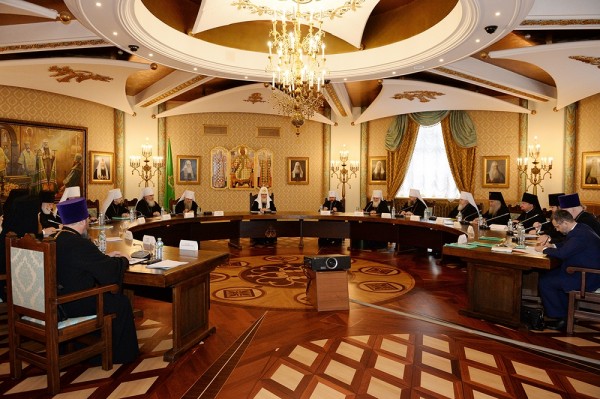The Primate of the Russian Orthodox Church welcomed the participants and delivered an address on the agenda.
The agenda includes issues pertaining to theological education, missionary activity, the work of Sunday schools, of the religious education centers and other institutions for education of children in the basics of the Orthodox faith.
‘I believe that all these issues are very important for the future of the Church and our nation. Most certainly, the Church exerts influence of the spiritual life of the nation. The time in which we live demands the use of different means by which the eternal God-revealed truth can reach the hearts and conscience of our contemporaries while our pious traditions are strictly upheld.
‘Therefore, whatever we are doing and trying to build will be of no value in isolation from our main goal – the salvation of people. Our success or failure can be seen in the family life, in the education of children and young people and their life and, first of all, in human hearts, in how they become more open to receiving God’s grace.
‘The Church should assist people in becoming more sensitive to God’s grace. May God grant that all our efforts help reach this goal,’ His Holiness said.
The Supreme Church Council chaired by His Holiness the Patriarch consists of:
Metropolitan Varsonofy of St. Petersburg and Ladoga, chancellor of the Moscow Patriarchate;
Metropolitan Hilarion of Volokolamsk, chairman of the Department for External Church Relations;
Metropolitan Clement of Kaluga and Borovsk, chairman of the ROC Publishing Council;
Metropolitan Ioann of Belgorod and Stary Oskol, chairman of the Synodal Department for Mission;
Metropolitan Merkury of Rostov and Novocherkassk, chairman of the Synodal Department for Education and Catechization;
Metropolitan Mark of Ryazan and Mikhailov, chairman of the Moscow Patriarchate’s Finance and Economic Administration;
Metropolitan Kirill of Stavropol and Nevinnomyssk, chairman of the Synodal Department for Relations with the Cossacks;
Archbishop Yevgeny of Vereya, chairman of the Holy Synod’s Education Committee;
Archbishop Feognost of Sergiev Posad, chairman of the Synodal Department for Monasteries and Monasticism;
Bishop Sergy of Solnechnogorsk, head of the Moscow Patriarchate’s Administrative Secretariat;
Bishop Irinarkh of Krasnogorsk, head of the Synodal Department for Prison Ministry;
Bishop Ignaty of Vyborg and Priozersk, chairman of the Synodal Department for Youth Affairs;
Bishop Panteleimon of Orekhovo-Zuevo, chairman of the Synodal Department for Church Charity and Social Ministry;
Bishop Tikhon of Yegorievsk, executive secretary of the Patriarchal Council for Culture;
Bishop Antony of Bogorodsk, head of the Administration of the Moscow Patriarchate’s Institutions Abroad;
Archpriest Sergy Privalov, chairman of the Synodal Department for Cooperation with the Armed Forces and Law Enforcement Agencies;
Archpriest Dimitry Smirnov, chairman of the Patriarchal Commission for Family and Protection of Motherhood and Childhood;
Mr. Vladimir Legoida, chairman of the Synodal Department for Church’s Relations with Society and Mass Media.
Invited to attend the session were Bishop Savva of Voskresensk, first deputy chancellor of the Moscow Patriarchate; Archimandrite Savva (Tutunov), deputy chancellor of the Moscow Patriarchate; Archpriest Maxim Kozlov, deputy chairman of the Education Committee of the Russian Orthodox Church; hegumeness Ksenia (Chernega), head of the Moscow Patriarchate’s Legal Service; and A.Schipkov, first deputy chairman of the Synodal Department for Church’s Relations with Society and Mass Media.

















